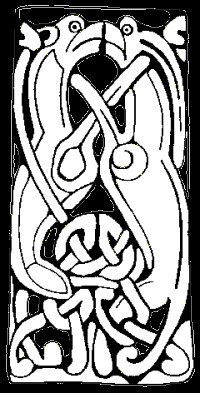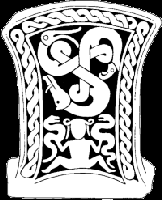
You may copy and redistribute this document freely, provided the author is notified prior to distribution. You may use the translations without fee or contract, provided the translator is notified prior to publication.

A common function of these insults in Icelandic literature was to allow a protagonist of questionable honour, such as Egill Skalla-Grímsson, Sinfjötli, or Loki, to declare an enemy to be of lesser status. By declaring a níð, "shaming", or engaging a senna, "flyting", the protagonist could use imagery which dishonoured their foe, and simultaneously prevented them from responding in kind without acknowledging the basis of the insult.
Possibly the best example of this inversion is in Egils saga Skalla-Grímssonar. After Berg-Önundr refused to allow Egill to claim Ásgerð's share of her father's inheritance, he challenges Önundr to hölmganga, against a threat of cowardice [chp. 56]:
Þá mælti Egill: "Hvárt mun Berg-Önundr heyra orð mín"While this may ring of schoolyard taunts in the ears of later societies, within the cultural context of medieval Norway, stating that a man would not fight for his honour and property called into his question his capability to manage that property and whether he had any honour to defend. Egill says Önundr will be a níðingr, literally "niggard", which at that time is inaccurate as he has not proven himself to be without honour. However this claim would become true if Önundr refused, which was a standard way of forcing an enemy into a duel. Following this, King Eiríkr blóðøx chases off Egill by boat, but fails to catch him.
"Heyri ek," sagði hann.
"Þá vil ek bjóða þér hólmgöngu ok þat, at vit berimsk hér á þinginu; hafi sá fé þetta, lönd ok lausa aura, er sigr fær, en þú ver hvers manns níðingr, ef þú þorir eigi."Then Egill asked: "Can Berg-Önundr hear my words?"
"I hear," said he.
"Then I will challenge you to ritual dueling, which shall be fought here at the Thing; winner takes all, land and gold, but if you back out, you will be a nithling man, as everyone will know."
That same summer, Harald hárfagri dies, and in order to secure his place on the throne, Eiríkr kills his two brothers. He then declares Egill an outlaw in Norway, and Berg-Önundr gathers a company of men to go after Egill, but is killed in the attempt. In an escape from Norway, Egill kills Rögnvaldr Eiríksson and then raises a níðstöng against his parents [chp. 57]:

|
Hann tók í hönd sér heslistöng ok gekk á bergsnös nökkura, þá er vissi til lands inn; þá tók hann hrosshöfuð ok setti upp á stöngina. Síðan veitti hann formála ok mælti svá: Hér set ek upp níðstöng, ok sný ek þessu níði á hönd Eiríki konungi ok Gunnhildi dróttningu, — hann sneri hrosshöfðinu inn á land, —“sný ek þessu níði á landvættir þær, er land þetta byggva, svá at allar fari þær villar vega, engi hendi né hitti sitt inni, fyrr en þær reka Eirík konung ok Gunnhildi ór landi.”Síðan skýtr hann stönginni niðr í bjargrifu ok lét þar standa; hann sneri ok höfðinu inn á land, en hann reist rúnar á stönginni, ok segja þær formála þenna allan.
He took in hand a hazel-stick and went upon a particular cliff-face, that faced the mainland; he took in hand a horse-head and set up a pole. He spoke this formally and shamingly: "Here I set up a níð-pole, and declare this níð against King Eiríkr and Queen Gunnhild," — he turned the horse-head to face the mainland — "I declare this níð at the land-spirits there, and the land itself, so that all will fare astray, not to hold nor find their places, not until the wreak King Eiríkr and Gunnhild from the land." He set up the pole of níð in the cliff-face and left it standing; he faced the horse's eyes on the land, and he rist runes upon the pole, and said all the formal words of the curse. |
When Egill put up his níðstöng, he was committing a crime of tréníð, "tree-shame", which was considered worse than tunguníð, "tongue-shame", similarly to the modern concepts of slander and libel. Except where under modern law, to write a defamation simply carries a greater fine than to speak one, according to Grágás, to carve a shame against someone could be punished by full outlawry, as opposed to a lesser three-year outlawry for a spoken shame. [Meulengracht Sørensen, pp. 17, 28.]
The lesser form of tunguníð is used when Sinfjötli encounters Granmarr [or his son Guðmundur in Helgakviða Hundingsbana I], and engages the Hunding in a senna, a kind of insult-match, with similar aspersions upon his opponent's honour. In this case, the hero is the illegitimate product of incest who has spent much of his life as a vargr, under both definitions of "outlaw" and "wolf". By any understanding of honour in Old Norse society, Sinfjötli's status is questionable at best, but it is he who immediately declares his enemy to be the lesser man, in Völsunga saga 9, and Helgakviða Hundingsbana I 32 - 44.
The primary difference between Sinfjötli's insults and Egil's, however, is not in the form they take, but in the substance. Nearly every insult the Völsung hurls is ýki, an "exaggeration" which could not possibly be true in the 'real' world, that Granmarr has variously been a witch, a valkyrja, the mother of nine wolves, and a mare [in Helgakviða Hundingsbana I, this last insult is in the other direction]. This is mitigated by the equally dire insults from the Hunding, that Sinfjötli lived as a wolf, killed his brothers, and sucked the blood of corpses. The difference is that Sinfjötli did all of these things.
However even within that context, the insults appear to be have a similar flavour, and Granmarr ends the senna in the same fashion that Sinfjötli began it, by threatening how his enemy will end the day. Again, a basic difference between the two warriors is shown, as Sinfjötli begins the exchange with an image of shaming, a leader of men doing the work of a þræll, feeding the farm-animals, and is given the ending with an image of death, feeding the ravens with his corpse. This is the final touch in how the Völsung clearly wins this contest over the Hunding, as an honourable death is considered a better fate than a dishonourable life. Sinfjötli not only forces his opponent to sink down to his level in self-defence, but shows greater poetic skill while doing so.
Lokasenna takes this form of verbal combat to an extreme, in which Loki engages the rest of the Æsir in a similar contest of insults, with a similar inversion to Sinfjötli's. Loki is called frumkveða flærðanna, often translated as "father of lies" but the closest he comes to lying in either the Poetic Edda or the Prose Edda is in Lokasenna, where he makes claims which can neither be proven nor disproven, and are not attested in any other source. He is of uncertain heritage, going by the matronymic Laufeyjarson, but he is also brother, or blood-brother, to Óðinn. This is parallel to Sinfjötli having shameful origins, but is brother to Sigurð and Helgi.
Every tunguníð which Loki places upon the other gods is shameful and slanderous, but most notable is the line at the end of both Lokasenna 23 and 24, «og hugða eg það args aðal.« Hollander translates the concept rather than the words, with "were these womanish ways, I ween," but this does not convey the weight this line carried in Old Icelandic. The word args is a form of ragr, about which Grágás says,
|
Þav ero orð þriú ef sva mioc versna máls endar manna, er scog gang varða avll. Ef maðr kallar man ragan eða stroðinn. eða sorðinn. Oc scal sva søkia sem avnnor full réttis orð. enda a maðr vígt igegn þeim orðum þrimr.
There are three words from maliced verse between men, which are punished with full outlawry. If a man calls a man ragr or stroðinn or sorðinn. And they shall be punished as fully slanderous words, and a man is given the right to kill for these words. |

|
Honour played an important rôle in Old Norse society, as is easily visible by the detail to which dishonours were described. Not only did laws exist to prohibit people from placing aspersions on another's honour, but breaking these laws could easily become a capital crime. In this light, statements and acts which reversed traditional concepts of nobility and honour become especially illuminating to the culture's values.
Egill Skalla-Grímsson is the great anti-hero of Icelandic literature, and in many ways resembles his god, Óðinn, who breaks oaths and attacks the unarmed. Likewise, Egill withholds from his family, kills for trifles, and practices sorcery. But when he is outlawed by King Eiríkr blóðøx, who has killed his own brothers to secure his throne and is married to Gunnhild, an adulteress in every source, the irony is not lost upon him. He erects a níðstöng to curse the royal couple and calls upon the land spirits to exile them, rather than himself.
Sinfjötli Sigmundsson, by contrast, must be considered the least of the Völsungs, as his very life would be considered unnatural. However, without him the line would not have survived, and in many ways he is the truest to the family line. For just as he is inseparable from this most famous of sagas, the Æsir could not be complete without Loki. The bale-smith of the gods also brings about the creation of Þór's hammer, Óðin's spear, Frey's boar and ship, and the wall around Ágarðr, amoung other accomplishments. He and Sinfjötli only appear to be more shameful than their peers until challenged, at which time the flaws of others are found to equal or surpass them.
Níð-curses were a method to bring a depth to the Old Norse concepts of honour and shame, by challenging the conventional understandings. Putting them into a formal structure gave this a recognised place in a society which, in a span of a few hundred years, had gone from heavily egalitarian to highly hierarchal. A living tradition by which the least respected could reveal anyone else to be no better than they were, could undermine the structure which had recently developed. As a result, strict laws were enacted against these insults, and the practice became confined to literature. This has left us with a colourful, if bizarre, selection of writings which preserved this practice along with other, more acceptible, forms of verse and prose.
Primary Sources
Egils saga Skalla-Grímssonar.
Grágás.
Helgakviða Hundingsbana I.
Lokasenna.
Snorri Sturluson. Edda.
Völsunga saga.
Secondary Sources
Gade, Kari Ellen. "Homosexuality and Rape of Males in Old Norse Law and Literature." Scandinavian Studies 58: 124-41, 1986.
Meulengracht Sørensen, Preben. The Unmanly Man: Concepts of Sexual Defamation in Early Northern Society. Trans. Joan Turville-Petre. Odense: Odense University Press, 1983.
Miller, Ian William. Bloodtaking and Peacemaking: Feud, Law, and Society in Saga Iceland. Chicago: University of Chicago Press, 1990.

Return to Loki: A Paean in Progress
This page is (almost) continually changing.